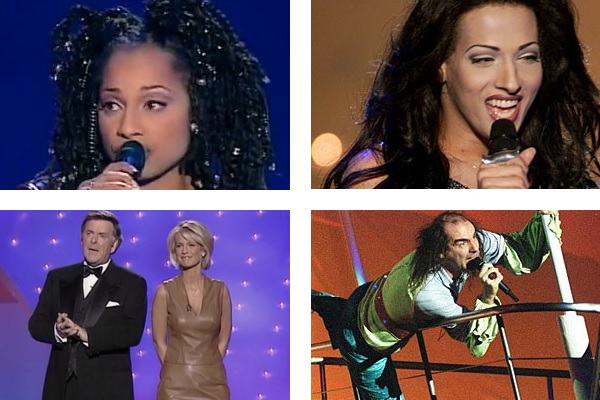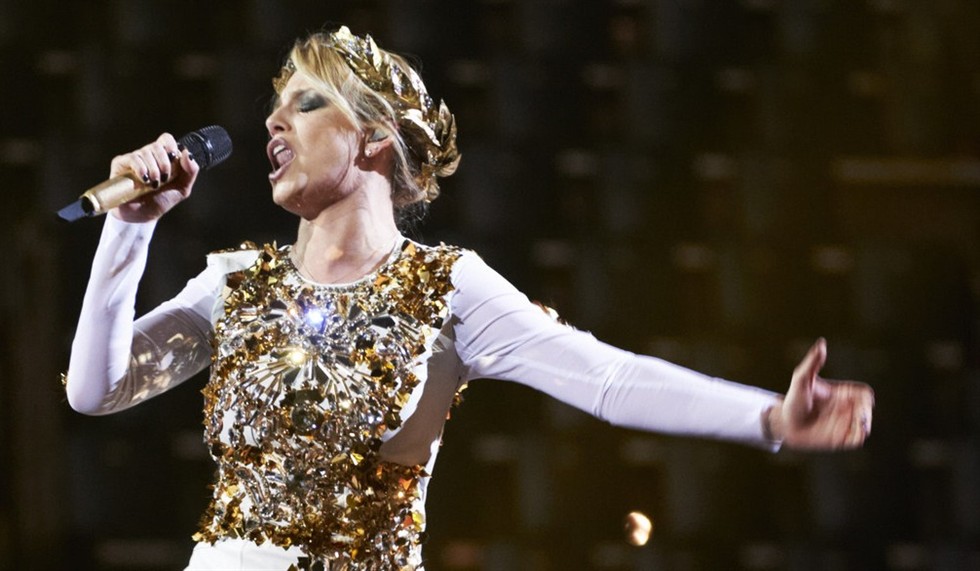Chris Halpin: Welcome to the first edition of the Wiwi Roundtable, the newest feature we’re launching on the website. Every month a group of your favourite wiwibloggers will talk about a Eurovision Song Contest from the past, chosen by a member of the panel. For the feature’s debut, I chose to go back to the 1998 contest, and I’m joined by Mike Bos in the Netherlands, Robyn Gallagher in New Zealand, and Ori Schneider in Israel!
https://www.youtube.com/watch?v=R5spdQLwD3U
Chris: Eurovision 1998 was the last of its kind. It marked the final time contestants had to sing in their national language, as well as the final appearance of the live orchestra. It was also, of course, the last time to date that the United Kingdom held the contest, with the BBC once again opting to eschew London. Their actual choice, the National Indoor Arena in Birmingham, was a safe bet though. The arena was the home of the Gladiators TV show and therefore was perfectly capable of holding a wide-scale TV event. Speaking of Gladiators, the BBC drafted in the show’s (then) extremely popular host Ulrika Jonsson to be Master of Ceremonies, alongside legendary BBC commentator Terry Wogan. Wogan actually hosted the show and provided his acerbic commentary, as the BBC set up a special booth for him just off stage.
Twenty-five countries took part in 1998 and what stands out to me is the sheer spread of competition within those 25 countries. Whilst 1997 was my “first” contest, the emotion of the UK winning probably took over six year old me at the time (so precious…), so I actually remember 1998 more. It felt like an actual national event in the UK—probably the last time that the country believed it was a legitimate force in the contest. Not to mention the fact that, to this day, Imaani’s “Where Are You” is likely the most culturally relevant song, at its time, that the UK has ever sent to Eurovision.
As for the competition aspect: yes, the UK were part of that top pack, but the level of the songs that did well (and, it’s nice to see that the best songs actually did well) is so far ahead of the rest it’s almost like watching two different shows. Israel, Malta, the UK, Netherlands and Croatia – coincidentally the top 5 – feel like genuine timeless Eurovision songs, ones that continue to be held in high regard to this day. You also, of course, have the unforgettable Guildo, in what I probably regard as the best use of a stage in Eurovision history. But after that, apart from the odd song (personally, I’m a fan of Marie Line’s “Où aller” for France) it does feel a bit like the show lacks depth. That’s not to say that the contest isn’t enjoyable. I certainly wouldn’t have picked it if I felt like that, but it’s one of those years where the very best rose to the top.
What about you guys – do you think that it was a stellar year for the Contest? Or do the best entries (if you agree with my assessment of them) make up for some of the others?
Mike Bos: Well, I liked Croatia, but I think it’s probably a song you forgot two days after you hear it. Israel, the UK and the Netherlands are kind of timeless songs – you go to a Eurovision party today and you will still hear them. Malta was definitely not my cup of tea—it was so boring but of course I also recognized it was quality! And what about that French song? I can’t get it out of my head.
The contest itself was okay, but both of the hosts were awful and the interval act was not very impressive either. Of course, this was the first year in which most countries were using televoting, so I wonder if this was the the main reason why Israel won over Malta?
Ori Schneider: I think the televote was indeed the reason Israel won Eurovision 1998. It wouldn’t have happened otherwise. Take for example Gina G in 1996 – that song was a dance tune and really up to date. It became a hit afterwards, but on the other hand didn’t have much success in Eurovision. If there wasn’t a televote, Israel would have maybe gotten a top 10 place, but definitely not a first. Only an excited crowd of people can bring a song like Dana’s to the top, not judges.
Eurovision 1998 always has a special place in my heart, and it’s only now that you call it “last of its kind” that I understand why. Watching it really feels like a piece of nostalgia. From 1999 on, a gradual process of modernization started. Everything that came later sounded more international, the performances became more grandiose, and the countries that weren’t fast enough to acclimate to the new changes (mostly those who used to be top 10 in former eras), were left behind to share the bottom of the scoreboard. Watching Eurovision 1998 feels like a safe haven back in time, one that we can run away to whenever we want a (more) predictable result and a classy old-school show.
Robyn Gallagher: I agree that outside of the top five, there were few stand-out performers. So many of the songs sound strangely bland, with little relation to what was in the charts in 1998. Can we blame the orchestra for this? Was there a temptation to use songs that made full use of the orchestra, resulting in a lot of sameness? It’s worth noting that four of the top 10 (including the winner) used a backing track instead of the live orchestra. And then there was Stefan Raab taking a bow as Germany’s “conductor”…
There’s another thing I want to bring up, the first nul point performance of the televote era – from Gunvor of Switzerland. Unlike some nul-pointers that are obviously awful, there wasn’t anything especially bad with “Lass’ ihn”. Behind the scenes, Gunvor was the victim of a cruel attack campaign from the Swiss tabloid press, even publishing sex scandal headlines on the day of the final. This nul points was also a sign of Switzerland’s future troubles in the televote era, with the neutral country struggling to score well in subsequent years.
Ori: Robyn – I was also very curious about Gunvor’s nil points. In 1998, after watching the show, it was one of the songs I really liked from first listen. The mystery of her extreme failure troubled me for years. Nowadays I know that some failures cannot be predicted, only analysed afterwards. But one thing is for sure: a result like that can only happen with a televote. It seems like the larger crowd of voters understands what’s good and what’s not better than we, as individuals, can understand. The voters don’t lie – if a song didn’t stand out, it just wouldn’t get votes. It doesn’t even matter that for many of us, Gunvor’s song and performance looked okay, even a bit likeable…
Robyn: There was apparently a bit of controversy over her dress too – from a distance, the embroidered rosebuds on the bodice looked like nipples! Some felt the dress was generally too sexy for the song.
Chris: I agree that Gunvor probably didn’t deserve her lack of success – though now looking at that dress I can’t see anything but that, Robyn, so thanks for that!
(Part Two coming later this week. Let us know your thoughts on the top 5 and any other songs you liked in the comments below!)











I recently watched the ESC’s of the last 35 years. I really liked the presenter of 1998, she felt very 21st-century-ish. And please, could nobody find nicer clothes for poor Chiara?
(and WHY was she wearing a waxed brown paper bag???)
Why can’t Ulrika Jonsson STAND STILL when she’s talking to camera????
@David: Soon enough you will ask English to be our new “Esperanto” … your ears must suffer a lot listening to sounds that aren’t familiar to your tiny brain. Is that a influence from your dad? You must have had a serious breakdown when Serbia won in 2007 …
@David: You must have a seriously A-level kid at school specially at French or whatever other language … no doubt!
1998 … the end of a beautiful story … the beginning of a trashy nightmare …
For me TOP 5 in 1998
1.United Kingdom
2.The Netherlands
3.Croatia
4.Sweden
5.Finland
I really like 1998 Eurovision!! *even I’m not yet 1 y.o at that time, lol* I remember that I still saved Estonia’s Mere Lapsed in my phone. I really like that ballad!
It was also the last appearance of both Hungary and Slovakia before they went on hiatus. The Hungarian entry didn’t have any appeal to me but ‘Modlitba’ sure was underrated. Even Wogan said that it was the best entry out of the Eastern countries participating.
Yes 1998 was definitely the last “old Eurovision”-styled eurovision contest. If it had not been for the televoting Diva would not have won.. it would have been a race between (like always in the 90s) a race between two english songs from Malta and the UK. I think also the fact that a modern dance track like Diva won also marked the start of the new eurovision! But lets be honest Eurovision did not get Modern until Eurovision 2000 in Stockholm. SVT really brought ESC into the new millenium with an updated and modern stage and overall production. Thank god… Read more »
Should have won Croatia… EPIC PERFORMANCE!!
For me, 1998 was a year of revelation. Guildo Horn brought ESC back to the screen here in Germany, now it was maybe not “cool” but more up to date than in 1997 and the years before.
My favourite song was “Kärleken är”, mainly due to the great voice of Jill Johnson. I think this was a reminder of the tragedy about Diana the year before.
i think Israel received a lot of points from juries (Romania, Slovakia)
I don’t know if Israel won. Because at the time of the 1998 contest, I wasn’t born. I was born a year after, on October 8.
I actually dont remember the 1998 contest or the 1999 contest, only 96 (my first) and 97 (hosted by my country) then I seemed to have skipped right through to Copenhagen 2001…wow where was I all this time?